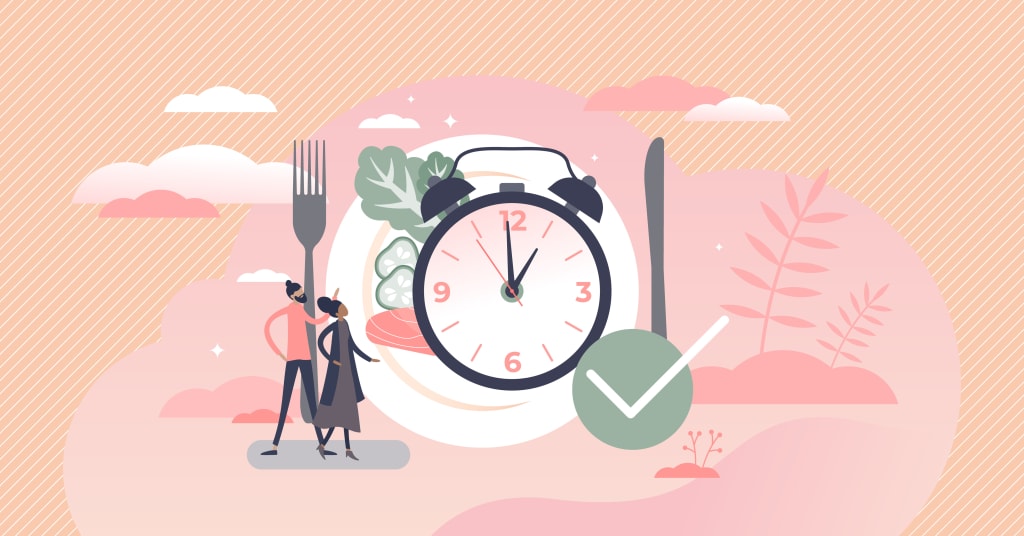Here’s What Happened After 2 Years of Intermittent Fasting
Intermittent fasting has made a huge difference in my health journey; here’s how I’ve stuck to it.

“I can’t skip breakfast,” I’d say regularly in the office kitchen.
“Me neither!” co-worker de jour, also getting their breakfast out of the fridge, would agree.
And I spent many years like that, bringing delicious little yogurt cups or small bags of oatmeal to work with me for breakfast every morning. The food I was eating was actually pretty healthy, but I was also eating way too much food in general.
I had no idea about my basal metabolic rate and just thought that old monicker of “an average of 2,000 calories per day” was actually what my small 5’0 body needed. It wasn’t. I gained a lot of weight.
It's surprisingly not too hard to learn what your basal metabolic rate is. This is the measurement of how many calories your individual body needs to perform basic functions like breathing, circulation, and cell production. The lesson here is that we usually eat a lot more than we actually need to sustain our basic functions.
Intermittent fasting is a lot easier than you think.
I was reluctant to start intermittent fasting. When I started my caloric deficit diet combined with intermittent fasting, I felt like I was dying of starvation for the first few days. Howver, once those painful first few days were over, it became effortless.
I started my diet changes out slow by doing little things like saying no to office treats. This helped, but it wasn’t enough to lose the weight I really needed to. If you need to lose weight for health or medical reasons like I did, it’s going to take some very big changes to the habits that you’ve ingrained into your very being. It’s not easy, but you can do it.
There’s a lot of great scientific studies out there on what intermittent fasting is and guides to short and long term fasting from doctors who have an excellent understanding of bodies and nutrition.
The beginning will be hard for you, but it gets easier.

Let’s go back to my first few days. I distinctly remember one morning when I was braving my daily terrifying, 60-mile drive from the western farmlands of New Jersey all the way up to Fort Lee, NJ, which is nestled in the shadow of the George Washington Bridge into New York.
I was so very hungry that I actually cried while I drove in traffic and drank my cold brew coffee sweetened with a little Splenda. It was ridiculous and I can laugh about it now. Not a pretty sight!
There’s never a perfect time to start a diet. But sometimes, you need to pull the trigger and ger started. You’ve always got things happening in your life that will make it difficult; that’s precisely why you’ve just got to dive in and start chasing your health goals.
Find a fasting routine that works for you.
I would have black coffee with only zero-calorie monkfruit sweetener in the morning to get me moving. Then, I wouldn't eat until noon. Within a week, I didn't even feel hungry until lunch time rolled around. A lot of the hunger you feel is habit, not a true need for calories.
I opted to skip breakfast since for my schedule, it was the easiest meal to forego. Depending on your health goals and any medical matters you might be working through, you can choose the meal schedule that works the best for you and your body.
Once your body adapts, you won’t even feel significantly hungry during your fasting window.

The great surprise is that once you work through those early hard days, you won’t even feel hungry anymore during the time period that you’re not eating.
I don’t put a bite of food into my mouth until lunchtime hits at noon. I can get to work and start my day without wasting any time on food and I feel just fine. There’s no stabbing hunger.
Intermittent fasting has become a way of life for me. On a normal day, I eat lunch and dinner. I've been very gradually losing my extra weight since 2018, when I was 60 pounds overweight. It's been slow progress, usually between 15 to 20 pounds a year.
However, it's been slow since I've been making changes that I can comfortably see myself living with for the rest of my life. Intermittent fasting is one of those things that makes it easier for me to honor my body's true caloric requirements since I split all my macro and micronutrients between two meals and sometimes a light snack of fruit.
There’s more than one kind of intermittent fasting you can try.
In any kind of diet you want to try, researching it is key. There’s two big kinds of intermittent fasting that I’ve personally found a lot of studies about. When you want to make permanent changes to your lifestyle and kick fad diets in the butt for good, you've got to do a lot of research and a bit of experimentation. It's a lot like science class.
First, a consistent routine of intermittent fasting where you fast for sixteen to eighteen hours per day. This counts when you’re sleeping, so it’s actually not as hard as it sounds.
Then there’s alternate-day fasting, where you alternate between fast and feast days. JAMA Internal Medicine published a study on the effect of alternate-day fasting on weight loss that followed people for an entire year. There’s quite a lot of interesting information on how that impacted both weight loss and weight maintenance after the diet was over, but quite a lot of the alternate-day fasters dropped out of the program.
If you want to experiment on your own, you can try both approaches. I personally prefer a steady schedule of intermittent fasting. I make it a point to eat all my meals between noon and eight o’clock in the evening. Since it’s consistent and regular, it’s much easier to stick with long-term.
Intermittent fasting can be good for weight loss or weight maintenance.

When you set your fasting window, be reasonable. Doing something like only eating one meal a day isn't going to be sustainable for your entire life. But since our bodies are adaptable, intermittent fasting can be something that helps you lose weight or helps you maintain your weight.
Harvard Health has compiled a ton of different studies on both humans and animals; the end results of intermittent fasting are pretty similar to other diets.
It’s a much easier dietetary change than many others.
So much about making successful lifestyle changes comes down to learning what you can stick with. Intermittent fasting is something that you get used to. Once you are used to it, it’s pretty easy to keep doing it.
When speaking with Harvard Health, Dr. Deborah Wexler, an associate professor at Harvard and a metabolic expert, shared her thoughts on intermittent fasting.
“There is evidence to suggest that the circadian rhythm fasting approach, where meals are restricted to an eight to 10-hour period of the daytime, is effective,” she confirmed, though generally, she recommends that people “use an eating approach that works for them and is sustainable to them.”
It’s dramatically easier to stick to your daily caloric requirement if you’re only eating during a very specific period of time.

When you’re on a routine of only eating in specific time windows, the temptation to snack on things outside of those windows is dramatically reduced. We’re creatures of habit and that’s usually a bad thing, but you can use that to your advantage.
For me, even once I’ve hit my weight loss goal, I plan to keep intermittent fasting as a long-term part of my routine. Right now, I’m only eating 1,200 calories per day. Since I’ve lost weight, for me to eat at maintenance, that’s only about 1,400 calories per day — nowhere near that dangerously vague 2,000 average.
If you split 1,400 evenly between three meals, we’d have some pretty tiny sums that I personally would have a hard time sticking with. However, by splitting that between just two meals per day, I’m confident that intermittent fasting will help me stick to my caloric guidelines and not regain the weight I’ve lost. Look at your numbers, experiment, and find out what works best for you.
About the Creator
Leigh Fisher
I'm a writer, bookworm, sci-fi space cadet, and coffee+tea fanatic living in Brooklyn. I have an MS in Integrated Design & Media (go figure) and I'm working on my MFA in Fiction at NYU. I share poetry on Instagram as @SleeplessAuthoress.






Comments
There are no comments for this story
Be the first to respond and start the conversation.